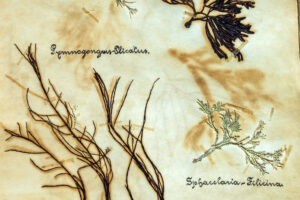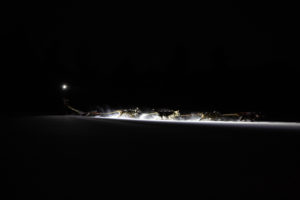Support Hidden Compass
Our articles are crafted by humans (not generative AI). Support Team Human with a contribution!
This story has been republished in the Hidden Compass Legacy Issue in celebration of reaching 100,000 readers.
The doorway is sealed shut with thick concrete. Above the entryway, the large, ocean blue signage announcing Gaza City’s al-Nasr picture house is half hidden by unpruned trees.
It’s the late 1990s and two young brothers — 10 years old, 12 at most — have somehow found a way in. The boys, who call themselves Tarzan and Arab, stand in the dank, abandoned projector’s booth and look out over the row of seats below, ripped and broken and covered in a coating of filth and dust. The boys are twins, identical and inseparable.
Al-Nasr, along with all of Gaza’s cinemas, closed in 1987; Tarzan and Arab were born in 1988.
They walk up stairs blackened from fire and dirt, and through shafts of light emanating not from a projector but from holes in the building. Debris crunches underfoot as the boys move through cavernous hallways: rubble, but also discarded strips of film, broken cassette tapes, scattered molehills of garbage, even the bones of dead vermin. The paint has cracked and faded on the walls, but dozens of film posters still hang, blistered and browned.
Tarzan and Arab have heard tell of what al-Nasr used to be. They’ve listened to descriptions of the crowds gathering noisily at the ticket window, of the beam of light from the projector and of the huge pictures, of the music emanating from the screen and the whispers from the patrons in their seats, as they were transported away from Gaza, together in the dark.
The brothers dig through rock for scraps of film. Before they leave, they go to the walls and scrape with their fingers at the corners of the faded old posters, peeling them off one by one.
They’re hard to take down. Sometimes, the boys would consider tearing down a chunk of the wall itself — and carrying the whole thing home.
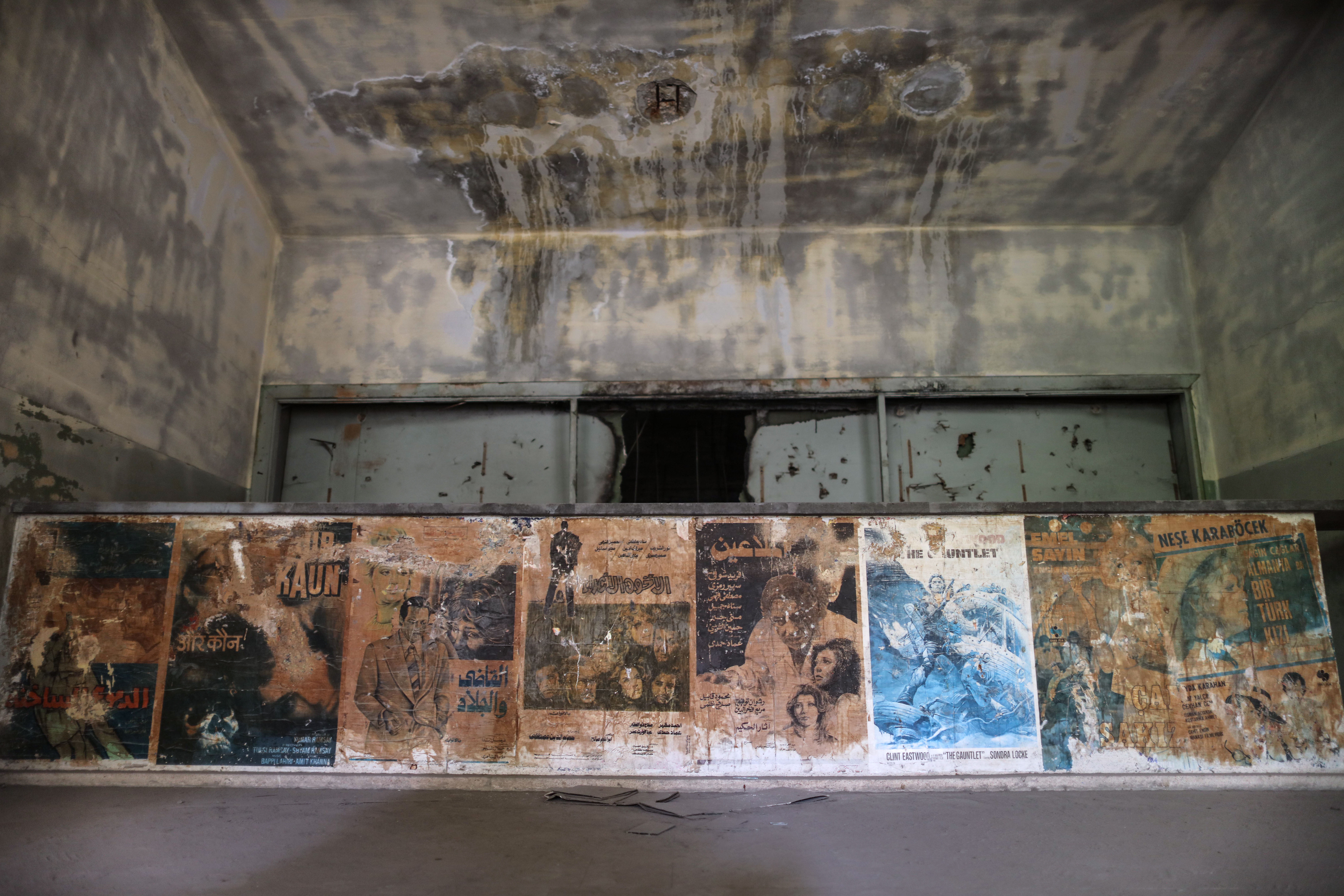
Faded film posters remain on the walls of Gaza City’s abandoned al-Nasr movie house. Photo: Xinhua/Alamy.
The twins’ dream was to one day see a movie in a cinema. They never had, and probably never would. They also dreamed of seeing the world outside of Gaza City.
But they never had. And probably never would.
~~
The street was narrow and lugubrious, sunlight blocked out from the dirt road by residential buildings huddled squat and tight. At the top of one of these, up stairs covered in graffiti and newspaper, I entered a rooftop studio. Wooden shelves sagged under the weight of VHS tapes and paperback books and dusty liquor bottles and ancient television sets. Strips of film hung in curled curtains from the ceiling.
It was late 2011, and I had traveled from London to Gaza to meet Tarzan and Arab, now in their early 20s. By now, the brothers shared another dream: They wanted to be filmmakers.
They called their studio Gazawood. Its walls plastered in collages of images, Gazawood was like a psychological and emotional bunker, sheltering them from the fighter jets roaring overhead, the whipcrack of rockets firing in the distance, the sectarian arguments in the febrile streets.
Israel had “disengaged” from the Gaza Strip in 2005, unilaterally dismantling and evacuating 25 Israeli settlements across the Strip and the West Bank and, in so doing, effectively ending an uncertain peace process between Israel and Palestine that had sputtered from summit to summit throughout the 1990s and all but collapsed since. In 2006, the militant movement Hamas won Palestine’s legislative elections and consolidated its power in an armed takeover of the Gaza Strip the following year. Since then, the conflict between Israel and Palestine had escalated, and kept on escalating.
Tarzan and Arab were very young people … with no freedom of movement and a life lived to the constant, humming, low-level fear of death created by violence and occupation.
I had just read one of the few articles then written about Tarzan and Arab: the Palestinian twins with the dramatic names, who dreamt of making movies and yet had never been inside a working movie theater. Just reading about them provoked in me a strong feeling of kinship. Because we were nearly the same age, and because the way they spoke about falling in love with movies, watching titles on tape out of their father’s collection, echoed the way I had fallen in love with movies, watching titles on tape out of my father’s collection.
But also because my mother is Egyptian, and because, on the few occasions when belligerent strangers have temporarily revoked my “whiteness,” hung up on the tan of my skin or the dark curl of my hair, their slur of choice is often to order me to “go back to Palestine,” as if the place itself was synonymous with being less than human.
We don’t look that different, them and me, in pictures of ourselves as children. And yet — because of the respective places we were born — they had no means of travel, had never seen a film at the cinema, and lived under privation and occupation, while I enjoyed every privilege and went to the movies most days of the week, even to see films I knew I wouldn’t like. Though it wouldn’t be easy, I could choose to get on a plane and go and see them. They had no option to do the reverse.
Yet I already felt jaded — making films had begun to put me in mind of financing applications, rejected screenplays, bouts of unemployment. While they, with vastly smaller resources and no realistic path forward, had something I lacked: a steadfast faith in the value of moving images.
~~
After flying to Cairo, I spent one night on Tahrir Square, which was crowded with flags and protestors, before being picked up at the crack of dawn by a driver I didn’t know.
It was the first year of the Arab Spring, and the Sinai, my driver told me in rudimentary English, was lawless. We needed to be out of Cairo before the sun was up, so we could be certain to make it across the desert before it went back down. He had one fist on the steering wheel and the other out the window, cigarette glowing between his knuckles and whipped with wind as he dodged and weaved through the thin morning traffic on Ismailia Desert Road.
“Not safe in the dark,” he grumbled with an apologetic smile as we set out on our 230-plus-mile journey.
We made no stops and hit Rafah — the one land entrance into Gaza controlled not by Israel, but by Egypt — before the sun dipped. Of the crossing into Gaza, I remember few vehicles and many loitering men on foot, and a passport office so carpeted in cigarette butts I couldn’t tell the color of the floor beneath. I carried a Swiss passport, with a Hamas-approved press visa stamped inside it, and was let through quickly.
My first impression of Gaza — portrayed in the media as a land of martyrs and suicide bombers — was of sunshine and poverty. Small fishing boats bobbed in the bay. Children bathed in the surf. Young men in knockoff European football shirts filled coffee shops from which music and the sound of televisions blared, loud enough to reach the opposite side of the street.
I could hear generators and see that the shops and apartments without them were dark. And I could not ignore how, every few minutes we traveled in the car, the line of buildings along the side of the road was suddenly interrupted where one of them had been turned to rubble.
Tarzan and Arab’s street was dark, though it was midafternoon. Filthy water stagnated in a long, shallow puddle down the middle of the roadway. A child in stained pajamas stared at me from his family’s front step.
The fixer I had arranged pointed me to the right door, and I went up the stairs.
~~
“Hello!” Arab blared when I emerged on the roof.
He grinned broadly and waved me in with a hand that held both a cigarette and a cup of tea and somehow kept each away from the other. Tarzan wore a trapper hat with the ear flaps down, though it was nearly 70 degrees Fahrenheit.
The brothers were tall and large, with thick beards and long hair that flowed over their shoulders. They chain-smoked and chain-drank tea. A friend of theirs, in jeans and a jersey, moved around the corners of the studio with a camera — taking pictures, documenting everything.
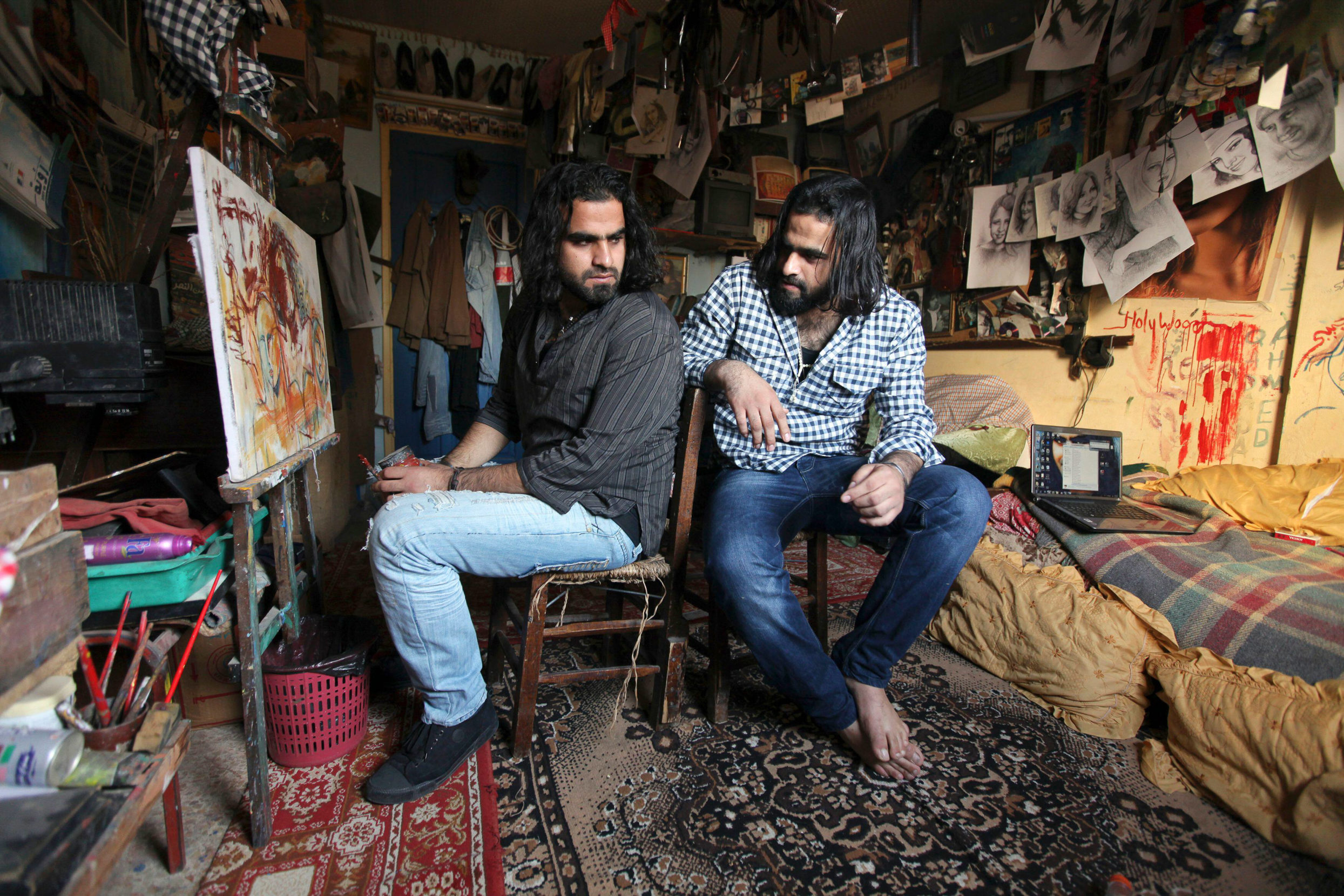
Twin brothers Ahmed and Mohamed Abu Nasser, better known as Tarzan and Arab, hold court in their Gazawood studio in 2010. Photo: Mohammed Salem/Reuters/Alamy.
Gazawood felt to me like a mix between an artist’s studio and a child’s private attic or treehouse. Tarzan and Arab had lived their entire lives in a sliver of land they were not permitted to leave and, unable to go into the world, they had created a world around themselves — as much an escape from Gaza as a celebration of it.
“Some people have complexes and will tell you that cinema is haram,” Arab said. “But in our view, sins are …” He hesitated. “God created life. Life is very beautiful. If you look around you, you’ll find a lot of very beautiful things. If you don’t notice those things, that’s a sin.”
He got heated, chopping the side of one hand into the palm of the other.
“If you don’t cherish those things, that’s a sin.”
~~
“If [our father] wanted to teach us something,” Tarzan told me, “he’d say, ‘Let’s go watch a film.’”
The color television set in the family’s living room became the young boys’ door to a wider world. The TV guide, Arab remembered, was like a schedule of all the possible departures through that gate.
Their father was the one to give his sons — born Ahmed and Mohamed — their nicknames. Tarzan, because he was uninhibited and brave, and because Edgar Rice Burroughs’s noble savage was then immensely popular in old movies and television shows played on Palestine’s TV screens. Arab, because he was more serious — clear and grounded.
When their father — who might have suspected he had accidentally opened a Pandora’s box — limited access to the living room set, the boys bartered around the neighborhood and found televisions to hide in their own room: “We had three without anyone knowing about them,” Tarzan said, hooked up to “a satellite dish we claimed to be using for the radio.” When it was impracticable to watch movies at home, or when their father — by now the principal at their school — made sure they didn’t leave school grounds, they devised a system to smuggle the smallest set into school, using ropes to lift it over the yard wall.
For every film, however, there was a price of admission. Arab remembered one particular picture — an Egyptian adaptation of The Brothers Karamazov, originally released in 1974 and starring Nour el-Sherif — that they snuck out of school for.
“We got hit with 13 lashes for that film,” Tarzan grinned.
“We got 12 for—” Arab cut back in.
“Thirteen lashes,” Tarzan continued. “We got beat in the cold, at six in the morning, so we could watch that film.”
Between viewings they dressed up like their favorite stars. “Amitab Bahchan’s suits,” Arab fired off from memory. “Marlon Brando’s T-shirt. Anthony Quinn’s trousers.” They copied the costumes down on paper, saved up their meager allowances, and went to the local tailor to have the outfits re-created.
“We were getting into trouble every day about our clothes,” Arab said. “‘Go home and get your uniform, or you’re going to get 12 lashes.’”
But to the twins, those clothes belonged in Gaza as much as they belonged in a Western or a brightly-colored Bollywood melodrama. They wore them to match their idea of their world.
“I loved it when they sent me to get changed,” Tarzan laughed, drawing on his cigarette. “I’d just go home and watch a movie.”
~~
“I felt like I had spent my life in a dark prison and all of a sudden it was opened, and I was let out into the world.”
Arab sat at a table in the open-air section of the roof, painting. In front of him were kitchen utensils, pots, herbs, a bag of ground coffee. Art supplies were scarce in Gaza, he said. Everything they created, they had to work out from scratch. In this case, Arab was blending paints — out of tomato sauce, thyme, and coffee.
As teenagers, the twins’ love of watching films had metastasized into a need to make films. Even at that age, they had only one certainty about that dream, Arab said: “It never comes true.”
The tension between impossible dreams and domestic immobility was natural, I understood, in a place like Gaza, where stagnation and death are often on your mind. The CIA’s World Factbook puts the median age in the Strip at 18, with 64% of inhabitants younger than 25. Tarzan and Arab were very young people, surrounded by other young people, with no freedom of movement and a life lived to the constant, humming, low-level fear of death created by violence and occupation.
Tarzan and Arab didn’t obsess over movies because they thought making them was possible; they obsessed over them because they had no other choice.
They spoke of the Lumière brothers, the inventors of the Cinématographe projector, saying that upon first seeing a film frame on the screen, one of the Frenchmen had said, in Tarzan’s words, “something very pretty — ‘This is the greatest defense against death.’” The quote is almost certainly apocryphal, but it expresses exactly why the twins needed to make movies.
Their furtive excursions to al-Nasr were like rituals, repeated pilgrimages to the old temple of an extinguished religion.
In time they bought an old photo camera and took turns behind it. When they got their hands on their first computer and discovered Photoshop, they sat by the screen for hours, downloading digital movie posters by the hundreds on a slow, intermittent connection, so they could paste their own faces onto the bodies of Hollywood’s leading men.
“We’d look at a poster for a Clint Eastwood film,” Arab says. “And we’d think — ‘What’s so different between me and Clint Eastwood?’”
~~
Tarzan chomps on a cigarillo, lips twisted in a snarl, beard trimmed to an Eastwood-esque grizzle. He stands under wooden beams in a corner of the Gazawood rooftop.
“Ready,” Arab calls out. He wears a white shirt and a black waistcoat. His hands are tied behind his back. His head is slipped through a sagging noose.
Tarzan grabs the other end of the rope, which has been thrown over the highest beam. He waits for the right moment — and pulls. The noose tightens around Arab’s neck and lifts him off his feet. His jaw tightens. His eyes bulge. After several seconds, fingers clawing at the rope at his throat, he roars out — and Tarzan lets go, releasing his brother to his feet.
It’s 2010, a year before I meet Tarzan and Arab, and they are shooting their first project, a series of posters.
“The idea was,” Arab recalled, “you look at the poster and imagine the film.”
This one is for an imagined Western titled Wooden Leg. “We hung me two or three times,” Arab added. “To get the right reaction.”
Over the course of several weeks, Tarzan and Arab created 20 posters for 20 nonexistent movies, building film locations in every corner of their rooftop studio. Each was named after one of the Israeli military operations that defined life in Gaza. That uniting theme wasn’t consciously political at first. “I just thought the person who came up with those names must be from Hollywood,” Tarzan said. “Operation Colorful Journey? What do you mean, colorful?”
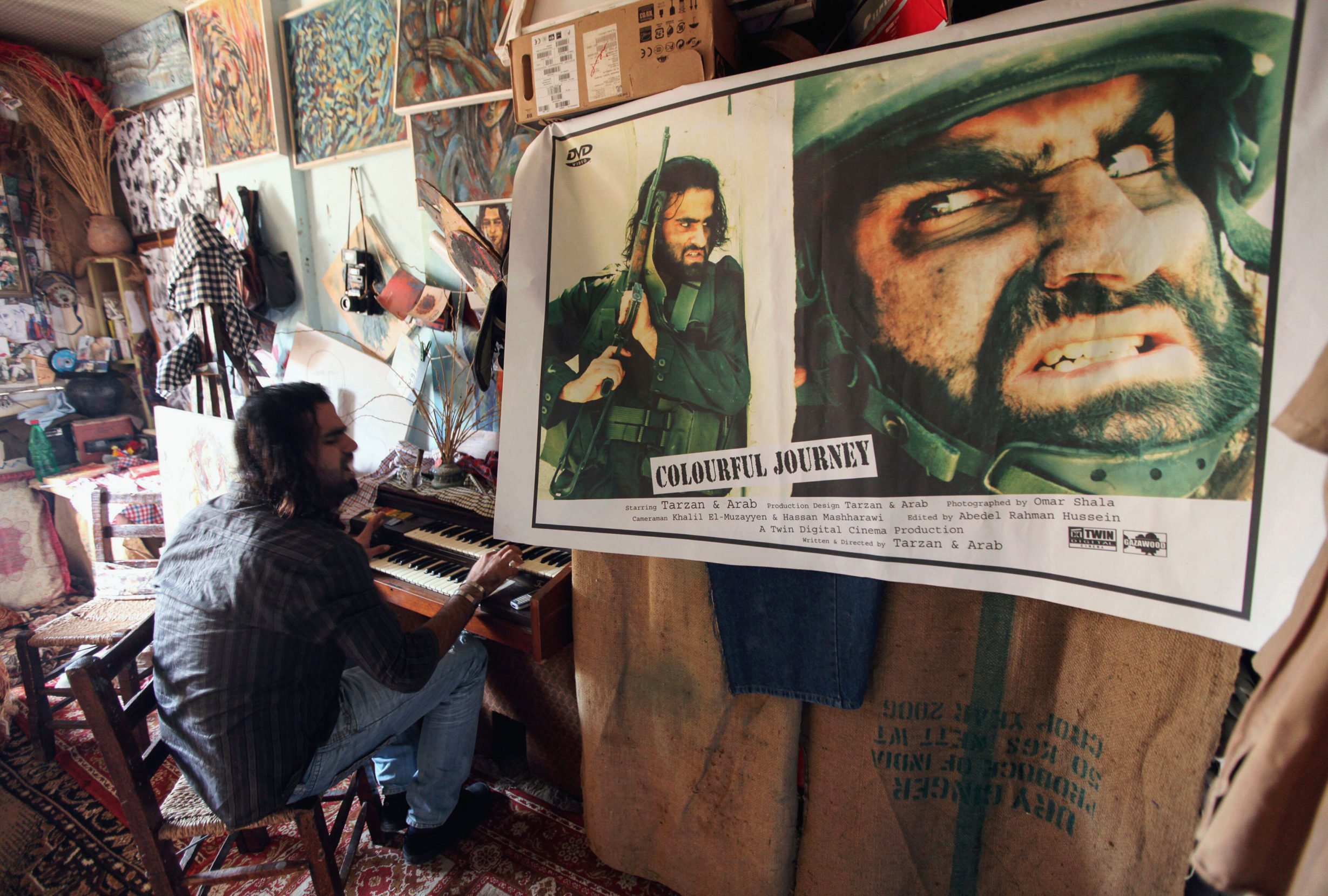
Tarzan plays piano in his Gaza home turned makeshift film studio, Gazawood, in 2010, where he and his brother conceived of a project that would create film posters for imagined films named after Israeli military operations. Photo: Mohammed Salem/Reuters/Alamy.
The concept was purposefully bittersweet. Tarzan and Arab were creating posters for films they knew they would never make, turning military operations with very real and very high death tolls into B-movie fantasies. Then Khalil al-Mozian came along.
Mozian is a Palestinian filmmaker of the generation before the twins. He can remember the cinema first arriving in the refugee camps of his native Rafah when he was a child in the 1970s, and the excitement at Gaza’s own movie houses in the years before they were shut down by Islamists. He had studied photography in Jerusalem, film in Saint Petersburg, journalism in Kalmar, Sweden — and had come back to Gaza.
Mozian had lived Tarzan and Arab’s dreams, and he was the first person to tell them theirs could come true.
With Mozian’s help, Tarzan and Arab shot Colourful Journey as a seven-minute short film, written and edited to play like a movie trailer. The three of them called in every possible favor to get it made. Weapons were borrowed from local militants, recording equipment from news crews, all under false pretenses. The short stars Tarzan and Arab as soldiers hunting each other across Gaza’s ruins and, unlike the posters in the series, is less about the Israeli occupation than it is the sectarianism and division among Palestinian factions in the Strip.
Mozian brokered support for the film, and the poster series, from the A.M. Qattan Foundation, a nonprofit based in Ramallah. The Foundation granted the twins their Young Artist of the Year award and arranged for the works to be exhibited in venues outside Palestine, including in Europe. The series drew acclaim and attention.
Tarzan and Arab remained in Gaza. Hard drives and printed posters could be shipped or smuggled out of Palestine, but human beings were another thing entirely. To a journalist from Britain’s Guardian, who congratulated them on the attention, Arab admitted a measure of melancholy.
“Imagine,” he said, shaking his head, “your dream becomes a reality — but you’re not in it.”
~~
The boys, who call themselves Tarzan and Arab, stand in the dank, abandoned projector’s booth and look out over the row of seats below, ripped and broken and covered in a coating of filth and dust.
From an altitude of 30,000 feet, Tarzan reflected, America looked like a computer motherboard. Suburban houses on suburban streets like connector slots along circuit tracks. Neat. Orderly.
A small group of film buffs from Austin, Texas — led by Alamo Drafthouse Cinema founder Tim League — had read about Tarzan and Arab, and seen their short film and their posters, around the same time I first read about the twins, and felt a similar kinship. They had no plans to go to Gaza to meet them — but they did want to fly the brothers to Texas. To go to the movies.
“It was our first time on a plane,” Tarzan said. “The first time we ever saw the Earth from above.” Arguably, the plane cabin was the most lavish space he and Arab had ever been in. Cushioned seats. Reliable electricity. A steady flow of drinks and snacks. Individual fans.
It had taken weeks to get them there. It had taken them lying to Hamas in Gaza and to Egyptian border control, inventing an urgent medical emergency to get through Rafah. It had taken Tim League’s office lobbying a U.S. Senator into greasing some wheels in Cairo.
“All the time,” Arab said, “we kept thinking: We’re going to the cinema. Even if it kills us, we’re going to the cinema.”
They were sneaking out to the movie house again, like when they were kids. Only this time, they were traveling 7,000 miles — and the cinema they were going to was actually showing pictures.
It took three flights to get from Cairo to Austin. “We spent the whole time looking out the window,” Tarzan said. Framed in the airline plexiglass was a vantage point so open, so detached from the confines of the Strip, the shelling, the gunfire, the sirens, even their studio.
When you’re that far above something — maybe a little bit like God — “nothing is out of place,” Tarzan smiled. “There’s nothing unnecessary.”
The Alamo Drafthouse Ritz, on Austin’s Sixth Street, wasn’t as grand as al-Nasr had been. But it had two working screens and neon signage. The seats were full. For the film that would be their first in a cinema, Tarzan and Arab had chosen their own short film — a project through which they had found meaning in Gaza’s suffering — followed by Ingmar Bergman’s Cries and Whispers, a film about finding meaning in hardship and sorrow.
When Tarzan and Arab walked across the cinema’s tiled forecourt and into the lobby, their eyes were wide and their expressions frozen in a mixture of wonder and trepidation. What struck Arab most was the smell — of popcorn and air-conditioning, sugar and salt. Tarzan was convinced he could “smell the film, smell the screen.”
“I’d only seen movie theaters and what’s in them in movies,” Arab added. “I felt like I had spent my life in a dark prison and all of a sudden it was opened, and I was let out into the world.”
~~
The phone calls began a few weeks after their return to Gaza. They came during the day and in the middle of the night. They were intended for Tarzan and Arab’s father.
Your sons are homosexuals, the callers said.
Your sons should dress more decently. They do not look like Muslims.
Your sons are communists and blasphemers.
Then came the decrees from the Ministry of Culture, banning the posters and the short film. And then came Tarzan and Arab’s arrests, by summons to the police station or by ambush in the streets.
Who invited you to travel abroad? Who paid for it? What did you do?
Why is your hair this way? Why is your beard so long?
Do you want to resemble the Prophet?
Always there were warnings and insults. Often, the brothers were beaten.
The phone calls continued. Tarzan and Arab’s father stopped answering the telephone. The callers left messages instead. The warnings became threats.
Something is going to happen to your sons.
Your sons are going to get themselves killed.
In 2012 — the year after I first met them, and the year after their brief trip to Austin — Tarzan and Arab fled Gaza. Hamas in Gaza, and Hamas-affiliated militants, had been harassing them and their family for months.
The aggressors were upset at being tricked, both in the making of Colourful Journey and in Tarzan and Arab’s smuggling themselves into Egypt. They were upset at Tarzan and Arab’s flamboyant clothes and public celebration of the movie house, a place the fundamentalists considered little more than a temple to pornography.
They were upset at the twins’ sudden notoriety, and how they used it to openly criticize the authorities in Gaza. To a local Texan journalist, the brothers had even dared to express open support for a two-state solution. (“We live, and they live,” Tarzan suggests on the newscast, with the air of a man who cannot, for the literal life of him, understand how anyone would disagree. “Why not?”)
Ultimately, the intimidation and harassment were too much to bear. Their parents told Tarzan and Arab to leave. The threats were serious.
So, in September 2012, the brothers packed suitcases in a hurry and exiled themselves under cover of darkness. They got as far as Amman, Jordan, where they were questioned for an hour and let go, temporary refugees.
“We didn’t choose to go,” Arab insists. “We didn’t have another option.”
They had always dreamt of leaving, but not like this. Like this, they may never be able to come back, and that isn’t freedom — that’s being locked out instead of in.
~~
In Amman, the brothers made another short film, this one with the support of other expatriate Palestinian artists and entrepreneurs. They gave it the unwieldy title of Condom Lead, a pun that works better in Arabic than it does in English. The film is about attempts to maintain intimacy and desire when under siege.
It became the first short film by Gazan filmmakers ever selected in competition at the Cannes Film Festival.
~~
The studio is covered in posters and cutouts and fragments of art on the walls. The wooden shelves are weighted down with books, cassettes, old televisions. Every surface is covered in rugs, throws, shags. High in one corner, Yasser Arafat smiles from the center of a railway station clock.
Tarzan and Arab sit close together on separate couches. In one hand Arab holds both a cigarette and a cup of tea, and somehow keeps one away from the other.
They have just finished their second feature film. The first, Dégradé, came out in 2015, and is about women trapped in a Gaza beauty salon when a tiger is stolen from a Hamas-run zoo by a local gangster. This one, titled Gaza, Mon Amour, is a tender story of late-life love between a Gaza fisherman and a woman who works at the city market. In the coming weeks it will premiere at the prestigious Venice Film Festival, and be selected by a Palestinian committee, under the supervision of the Ministry of Culture, as Palestine’s official Oscar submission in the Best International Film category.
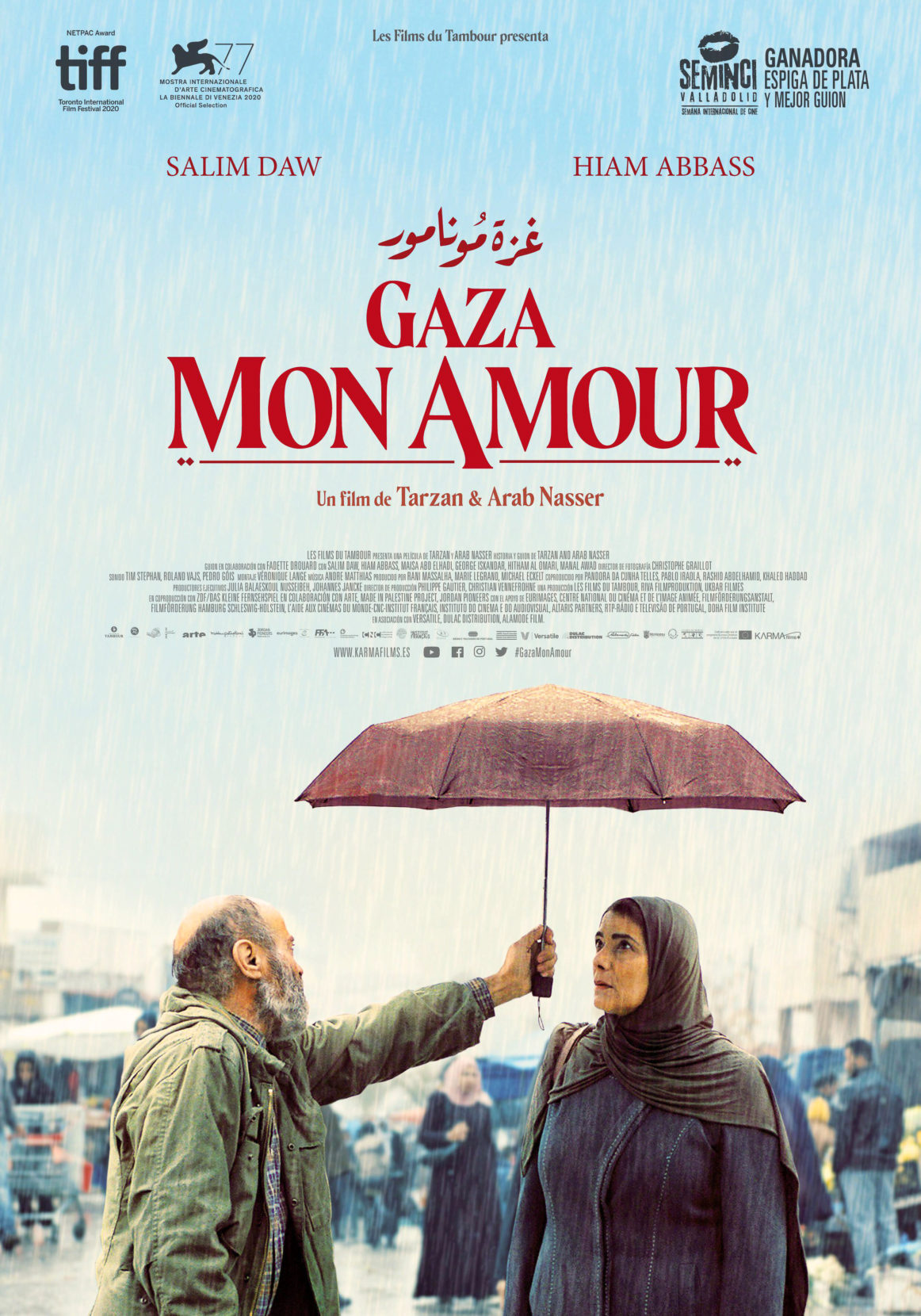
In 2020, Tarzan and Arab released their second feature film, Gaza, Mon Amour. Photo: Les Films du Tambou/Album/Alamy.
The twins and I are about to talk about movies again, for the first time in several years. “It never comes true,” Arab had once told me of their childhood dream, and yet here they are. Acclaimed, well-known filmmakers. Free to travel the world. Accustomed to red carpets and Q&A sessions and standing ovations.
“What’s so different between me and Clint Eastwood?”
Arab leans forward to put his cigarette out.
On the other side of the window, the French city of Montereau-Fault-Yonne is pale and gray.
~~
I grew up just an hour’s drive north of here. Entirely by coincidence, this is where Tarzan and Arab have chosen to settle. Amman was too close to Gaza. Too complicated. They chose France partly because artists’ visas were offered to them, and partly, again, because of images: the one of the country they had built in their minds, the ones they had seen of Truffaut and Godard and cigarettes and coffee, of the Nouvelle Vague’s young filmmakers with their handheld 16mm cameras and their uncompromising passion.
Today, the twins — now in their early 30s — are easier to tell apart, even in identical eyeliner and black combat boots, as they’ve sported in countless red carpet photographs. They’re impossible to miss or peel your eyes away from. Their appearance is curated — natural but not at all spontaneous. At the Venice Biennale they attended in leather jackets (one short, one long) and broad collar necklaces (one gold, one silver) over the same black trousers (the hem of one pair trimmed with scissors, the other rolled).
But the telltale differences are there. Arab’s mane is shaggier; Tarzan’s beard is waxed to a neater point. Their personalities have reversed from those that prompted their nicknames. Now Arab is the gregarious, outgoing, talkative one, a Cheshire cat smile wrapped in black fleece and clouds of cigarette smoke. Tarzan is quieter. It’s hard to tell if he’s intense, or simply guarded.
The brothers argue about small things, but never about big ones. “We are one head, with two bodies,” is how Arab describes it.
Gazawood was like a psychological bunker, sheltering them from the fighter jets roaring overhead, the whipcrack of rockets firing in the distance, the sectarian arguments in the febrile streets.
The studio in Montereau is a time capsule. On one side of the door is France. On the other side, somehow, is a version of the studio in Gaza. Here is the art, and the posters, and the rugs. The ashtrays and the teacups.
These are the belongings with which they packed their suitcases, in the fall of 2012. Every place the twins moved into after Gazawood felt empty, at first. “So every time we fill them,” Arab says, “until we cover up what it was.”
Things in France are “easy,” Arab tells me with a sad smile, “but I wouldn’t say that I am happy. I cannot say that I am happy. France isn’t home.”
The twins haven’t been back to Gaza since they were forced out, and may never be able to return. They shot Dégradé and most of Gaza, Mon Amour in Jordan. Gaza’s seaside market, as portrayed in the latter film, was re-created in Portugal.
When I first met the twins, a decade ago, they told me they would never direct a film set anywhere other than Gaza. Back then, they wanted to show the world the Strip was more than stereotypes held it to be, and that’s still true today. But there’s something more to it now: making films is how they go home.
“When we are filming,” Arab says, “it’s like being back in Gaza. We choose every object; we design every set. Every detail. If you asked us why we make films,” he smiles, “I would tell you: the idea of creation. To be a creator. Like — you know, the small god, which is to create. Le petit dieu.”
I’ve always thought of the twins’ love of film as escapism, but it strikes me now it’s as much about order — about things playing out in a way that has meaning. One thing leading to the other. Nothing out of place. Nothing unnecessary.
Their lives are the opposite. They make films now, but they no longer have access to the home they want to film. They are free to travel, but at the cost of having been displaced.
They craft their films painstakingly. The stories are fiction, but they fill the scripts with characters and incidents from their own past in Gaza. They write parts expressly for Palestinian actors who will understand them: Hiam Abbass, Salim Daw, Maisa Abd Elhadi, Manal Awad. It feels better to re-create Gaza than forget it.
Sometimes, leaving — when you don’t choose the when, or the how, or the how long — is the opposite of moving on. Old homes and new overlap, like a double exposure, two realities in one frame of existence.
“Gaza isn’t like elsewhere,” Arab says. “All over the world, humanity is everywhere. But Gaza is our doorway.”
###
As of May 2023, Tarzan and Arab remain in France, still unable to return to Gaza.
Paul Fischer
Paul Fischer is an author, screenwriter, and filmmaker. Born in Saudi Arabia and raised in France, he now lives in the United Kingdom.

